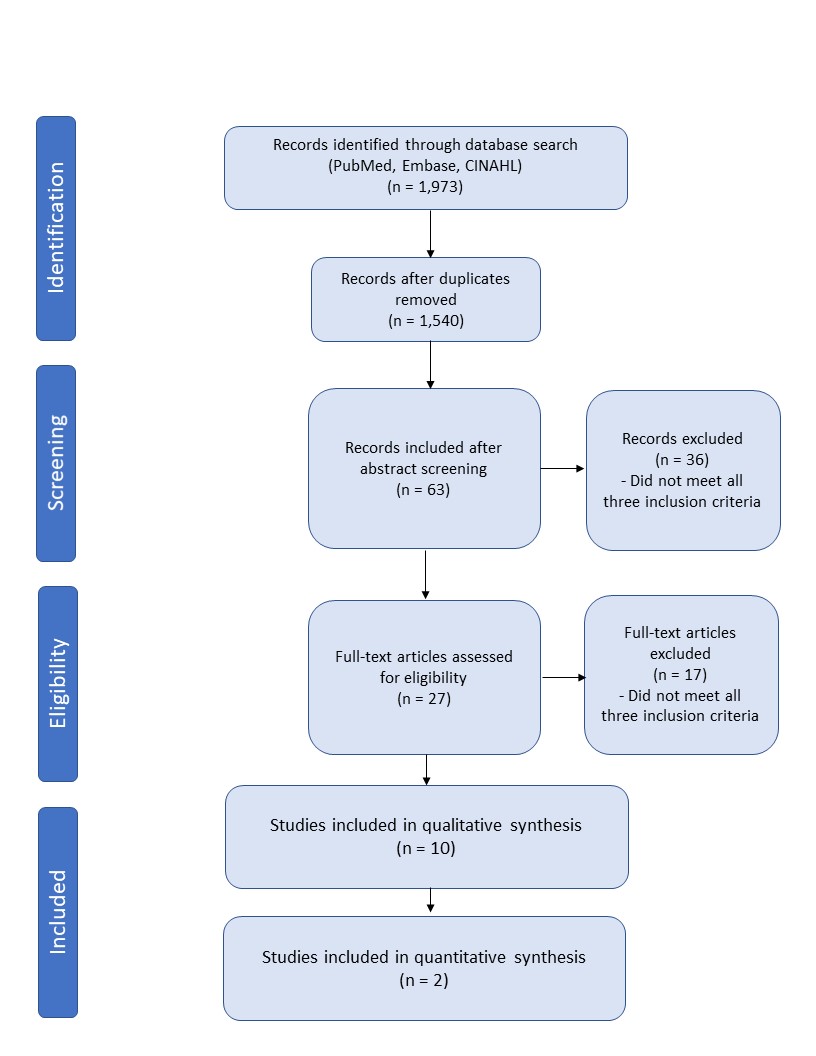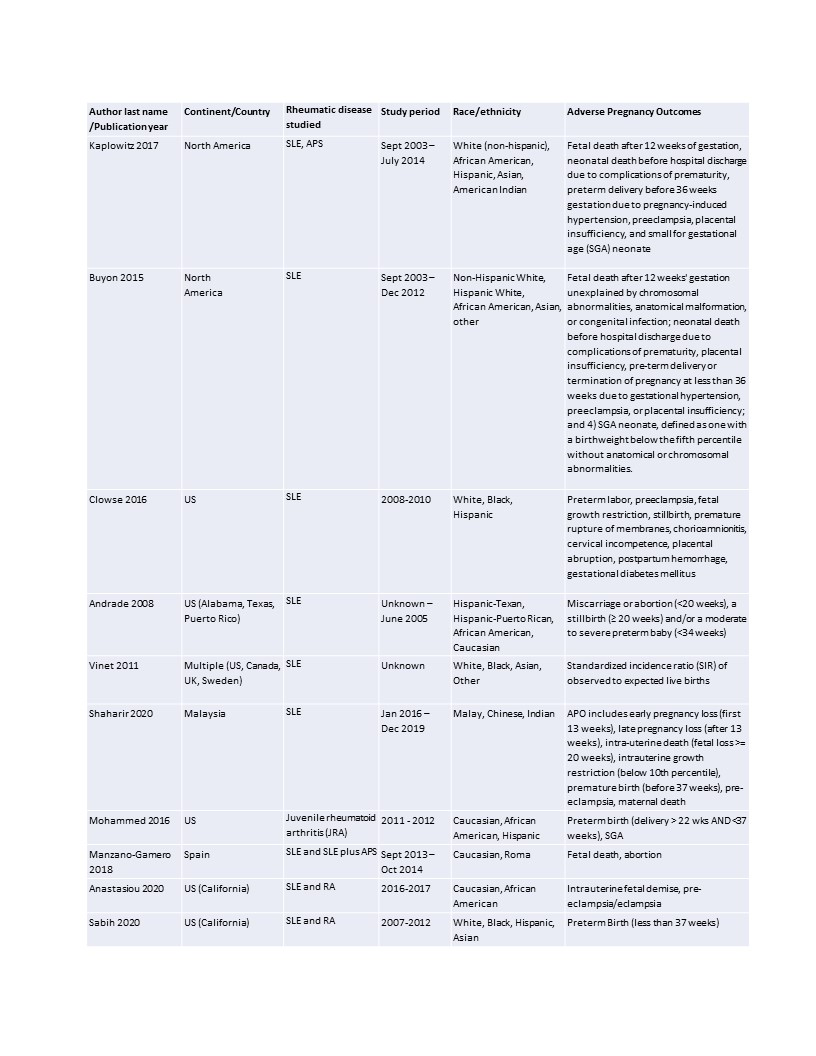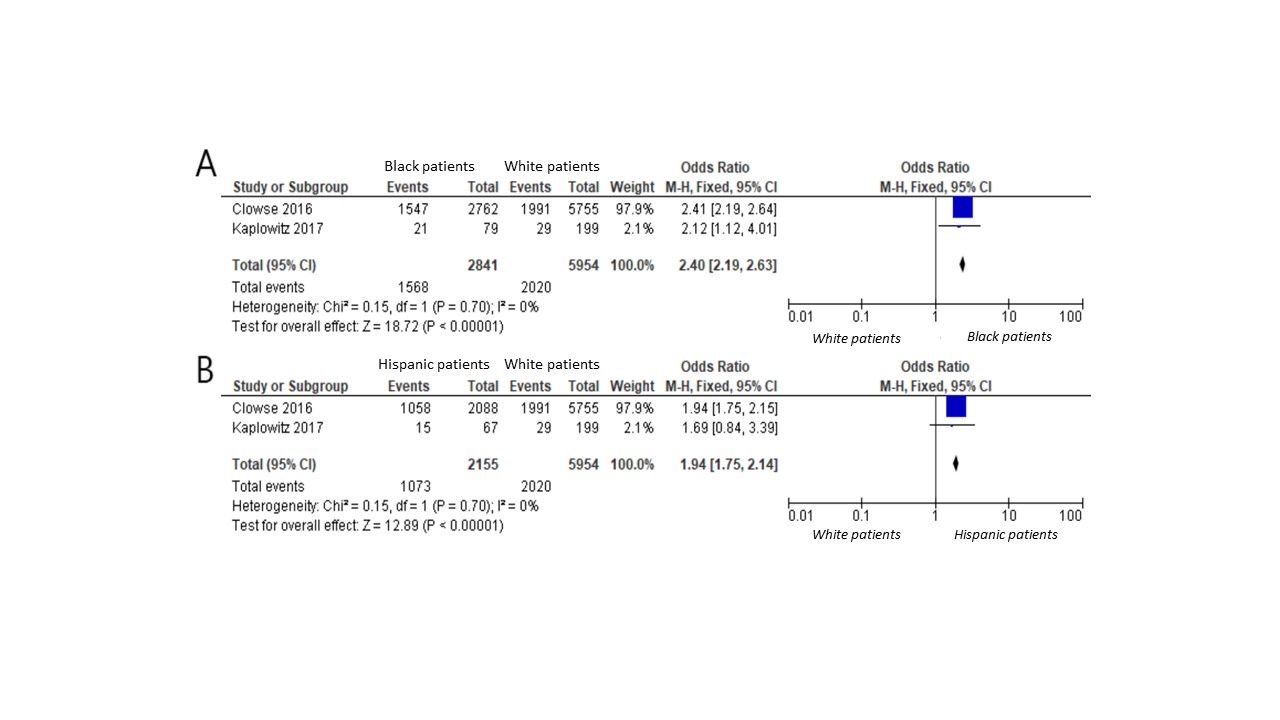Session Information
Session Type: Poster Session B
Session Time: 8:30AM-10:30AM
Background/Purpose: Women are disproportionately affected by rheumatic diseases (RD), with many of them carrying the diagnosis in their childbearing years. Pregnant women with RD have a high prevalence of adverse pregnancy outcomes (APO) owing to a multitude of factors. Racial/ethnic disparities in APO are well-recognized in the general population, however the understanding for this among women with RD is limited. While there are studies which have explored the impact of race/ethnicity on APO among patients with RD, limitations of RD type and race ascertainment prevent single studies from synthesizing a complete analysis. We conducted a systematic literature review to evaluate the impact of race/ethnicity on APO in women with RD.
Methods: Systematic literature searches in PubMed, Embase, and Cumulative Index for Nursing and Allied Health Literature (CINAHL) Complete were conducted to identify potentially eligible studies. Inclusion criteria consisted of all study designs except for case reports and narrative reviews, presence of RD and APO, and data pertaining to race/ethnicity. Conference abstracts published before 2015 and non-English articles were excluded.
Results: A total of 1540 references remained after duplicates were removed of which full text review was done for 27 articles (Figure 1). These were independently reviewed by three co-authors (GS, IJH, and MS) and discrepancies were resolved by a fourth co-author (NS). Study quality was assessed using Newcastle-Ottawa Scale. Ten studies met our eligibility criteria to be included in the literature review (Table 1).
Of the 10 studies, 7 were from North America, 1 from Europe, 1 from Asia, and 1 multicontinental. Most of them were cohort studies, except one that was a cross-sectional study. One study examined racial/ethnic disparities among patients with juvenile idiopathic arthritis (JIA). The remaining 9 studies looked at patients with systemic lupus erythematosus (SLE) of which 2 included patients with antiphospholipid antibody syndrome (APS), and 2 included patients with rheumatoid arthritis (RA).
Because of the significant differences between the studies, pooled analysis could only be carried out using two studies (Figure 2). Among patients with SLE, Black patients had higher odds of APO compared to White patients, with a pooled odds ratio (OR) of 2.40 [95% CI 2.19 – 2.63]. Similarly, Hispanic patients had higher odds of APO compared to White patients with a pooled OR of 1.94 [95% CI 1.75 – 2.14].
Conclusion: This systematic literature review highlights that racial/ethnic minority populations with RD are more prone to APO compared to their White counterparts. Eight out of the nine studies involving White patients are consistent with these findings. Pooled analysis was limited due to multiple factors including heterogeneity in the study population, variation in the outcomes of interest, and different definitions for APO. Standardized criteria for APO are necessary to allow direct comparisons between studies. SLE has been the focus in most of these studies and there is a paucity of data looking at other RDs. Further research is needed to explore the causes for the racial/ethnic disparities and how these can be addressed.
To cite this abstract in AMA style:
Swaminathan M, Shen G, Huang I, Louden D, Tahir W, Singh N. Racial and Ethnic Disparities in Pregnancy Outcomes Among Women with Rheumatic Diseases: A Systematic Literature Review and Quantitative Analysis [abstract]. Arthritis Rheumatol. 2021; 73 (suppl 9). https://acrabstracts.org/abstract/racial-and-ethnic-disparities-in-pregnancy-outcomes-among-women-with-rheumatic-diseases-a-systematic-literature-review-and-quantitative-analysis/. Accessed .« Back to ACR Convergence 2021
ACR Meeting Abstracts - https://acrabstracts.org/abstract/racial-and-ethnic-disparities-in-pregnancy-outcomes-among-women-with-rheumatic-diseases-a-systematic-literature-review-and-quantitative-analysis/



